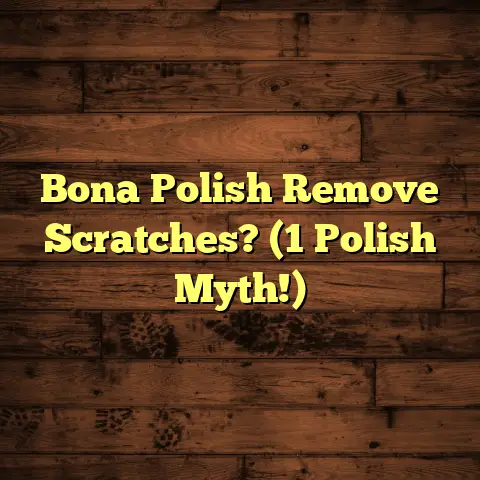Dawn Soap Safe For Wood Floors? (2 Products To AVOID!)
I’ve seen it all when it comes to wood floors – the good, the bad, and the downright ugly.
One question I get asked all the time is: “Is Dawn soap safe for my wood floors?”
Maintaining wood floors can feel like walking a tightrope, right?
You want them sparkling clean, but you also don’t want to accidentally ruin that gorgeous finish you invested in.
There are so many cleaning products out there, and it’s tough to know what’s safe.
Dawn soap is a household name, known for its grease-cutting power and gentle reputation.
It’s often recommended for everything from washing dishes to rescuing wildlife.
But is it really safe for your precious
wood floors?
Let’s dive in and find out!
Section 1: Understanding Wood Floors and Their Maintenance
1.1 The Beauty and Vulnerability of Wood Floors
Let’s face it, wood floors are stunning.
They add warmth, character, and value to any home.
The unique grain patterns and rich colors create a timeless elegance that’s hard to beat.
But here’s the thing: wood is a natural material, which means it’s susceptible to damage.
Unlike tile or concrete, wood can be affected by moisture, scratches, and harsh chemicals.
Think of your wood floor like a fine piece of furniture.
You wouldn’t use just any cleaner on your antique table, would you?
The same principle applies to your floors.
1.2 Common Cleaning Challenges
What are some of the biggest headaches when it comes to cleaning wood floors?
- Residue Buildup: This can make your floors look dull and cloudy over time.
- Dullness: Losing that beautiful shine is a real bummer.
- Scratches: These can happen easily from furniture, pets, or even just everyday foot traffic.
Using the wrong cleaning products can exacerbate these issues.
Harsh chemicals can strip away the finish, leading to discoloration, warping, and even permanent damage.
That’s why choosing the right cleaning method is so crucial for keeping your wood floors looking their best for years to come.
Section 2: The Appeal of Dawn Soap
2.1 Overview of Dawn Soap
Dawn dish soap has been around for decades.
Procter & Gamble introduced it in 1973, and it quickly became a household staple.
It’s primarily used for washing dishes, but it’s also gained popularity for other cleaning tasks due to its grease-cutting abilities.
Dawn comes in several formulations, including:
- Original: The classic formula we all know and love.
- Ultra: A more concentrated version for extra cleaning power.
- Antibacterial: Contains antibacterial agents for added germ-killing properties.
2.2 Reasons for Popularity
So, why do so many people consider using Dawn soap on their wood floors?
- Effectiveness in Cutting Grease: Dawn is famous for its ability to break down grease and grime, making it an appealing option for tackling tough messes.
- Ease of Availability: You can find Dawn soap at virtually any grocery store or drugstore.
- Affordability: Compared to specialized wood floor cleaners, Dawn is a budget-friendly option.
Because of these factors, many people wonder if they can use Dawn soap as a convenient solution for keeping their wood floors clean.
Section 3: The Science of Cleaning Wood Floors
3.1 Understanding Flooring Finishes
Before we get into the nitty-gritty of Dawn soap, let’s talk about wood floor finishes.
The type of finish on your floor plays a huge role in how you should clean it.
Here are some common types of finishes:
- Polyurethane: This is a durable, protective coating that’s resistant to scratches and moisture.
It’s one of the most popular choices for wood floors. - Oil-Based: These finishes penetrate the wood, providing a natural look and feel.
They require regular maintenance with specialized oils. - Water-Based: Similar to polyurethane, but with lower VOCs (volatile organic compounds).
They tend to be more environmentally friendly. - Wax Finishes: These finishes need special cleaning and maintenance.
- Varnish: A glossy, durable finish that can be more brittle than polyurethane.
Each finish reacts differently to various cleaning products.
What works well on a polyurethane finish might damage an oil-based finish.
3.2 The Impact of pH Levels
pH levels measure how acidic or alkaline a substance is.
The pH scale ranges from 0 to 14, with 7 being neutral.
- Acidic: pH below 7
- Neutral: pH of 7
- Alkaline: pH above 7
The pH level of your cleaning product can affect your wood floor’s finish.
Highly acidic or alkaline cleaners can damage or strip the finish, leading to discoloration and other problems.
According to Dawn’s Safety Data Sheet (SDS), Dawn dish soap typically has a pH level around 9-10, making it slightly alkaline.
This alkalinity, while effective for cutting grease, can be problematic for certain wood floor finishes over time.
[Source: Dawn SDS]
Section 4: Is Dawn Soap Safe for Wood Floors?
4.1 Analyzing Ingredients
Let’s take a closer look at the ingredients in Dawn soap and how they might affect your wood floors.
The main cleaning agents in Dawn are surfactants, which help to lift dirt and grease.
While these surfactants are effective, they can also leave behind a residue if not properly rinsed.
Other ingredients, like fragrances and dyes, can also contribute to buildup and dullness over time.
The alkalinity of Dawn soap, combined with these ingredients, can potentially break down certain wood floor finishes, especially with repeated use.
4.2 Scrutinizing User Experiences
I’ve talked to countless homeowners over the years about their experiences with cleaning wood floors.
Here’s what I’ve gathered about using Dawn soap:
- Positive Experiences: Some homeowners report that Dawn soap works well for occasional spot cleaning and doesn’t cause any noticeable damage.
- Negative Experiences: Others have experienced dullness, residue buildup, and even damage to the finish after using Dawn soap regularly.
One homeowner told me, “I used Dawn on my floors for years, and they always looked clean.
But then I noticed they started to look dull and cloudy.
I switched to a wood floor cleaner, and the difference was amazing!”
It’s important to remember that everyone’s experience will vary depending on their floor finish, cleaning habits, and the specific Dawn formulation they use.
4.3 Expert Opinions
As a flooring contractor, I always recommend using cleaning products specifically designed for wood floors.
These products are formulated to be pH-neutral and won’t damage the finish.
Many cleaning experts agree that while Dawn soap might be okay for occasional spot cleaning, it’s not a suitable long-term solution for cleaning wood floors.
The National Wood Flooring Association (NWFA) recommends using cleaning products that are specifically designed for wood floors and following the manufacturer’s instructions.
Using the wrong cleaning product can void your floor’s warranty and lead to costly repairs.
Section 5: Products to AVOID
Okay, so we’ve established that Dawn soap might not be the best choice for your wood floors.
But are there any specific Dawn products you should definitely avoid?
Absolutely!
5.1 Product 1: Dawn Antibacterial Dish Soap
This is a big no-no for wood floors.
The antibacterial agents in this formulation can be particularly harsh on wood finishes.
These chemicals can strip away the protective coating, leading to discoloration and damage.
Plus, the antibacterial ingredients can leave behind a sticky residue that’s difficult to remove.
I’ve seen floors that have been severely damaged by antibacterial cleaners, and it’s not a pretty sight.
Trust me, you want to steer clear of this one!
5.2 Product 2: Dawn Ultra Dishwashing Liquid
While the regular Dawn dish soap isn’t ideal, the Ultra version is even more concentrated.
This means it contains a higher concentration of surfactants and other cleaning agents.
The increased concentration makes it more likely to leave behind a residue, which can dull your floors and attract dirt.
Also, because it’s so concentrated, it’s easy to use too much, which can exacerbate the problem.
Section 6: Alternative Cleaning Solutions
6.1 Introduction to Safe Cleaning Products
So, what should you use instead of Dawn soap?
Fortunately, there are plenty of safe and effective cleaning products specifically designed for wood floors.
Look for products that are pH-neutral and labeled as safe for wood floors.
Many of these products contain ingredients that help to protect and nourish the wood.
Some popular brands include Bona, Murphy Oil Soap (use sparingly and diluted!), and Method.
Always follow the manufacturer’s instructions for best results.
6.2 DIY Cleaning Solutions
If you prefer a more natural approach, you can also create your own DIY wood floor cleaner using simple ingredients.
Here’s a recipe I often recommend to my clients:
DIY Wood Floor Cleaner
- 1/4 cup white vinegar
- 1 gallon warm water
- A few drops of essential oil (optional, for scent)
Mix the ingredients in a bucket and use a damp mop to clean your floors.
Be sure to wring out the mop thoroughly to avoid over-wetting the wood.
Vinegar is a natural disinfectant and helps to cut through grime.
The essential oil adds a pleasant scent and can also provide additional cleaning benefits.
Lavender, lemon, and tea tree oil are all great options.
Important Note: Always test any cleaning solution in an inconspicuous area first to make sure it doesn’t damage the finish.
Conclusion
So, is Dawn soap safe for wood floors?
While it might be okay for occasional spot cleaning, it’s not a suitable long-term solution.
The alkalinity and ingredients in Dawn soap can potentially damage the finish, leading to dullness, residue buildup, and even costly repairs.
Dawn Antibacterial and Dawn Ultra should be avoided altogether due to their harsh chemicals and high concentration.
Instead, opt for cleaning products specifically designed for wood floors or create your own DIY cleaner using natural ingredients.
By prioritizing the health of your wood floors and being informed about the products you use, you can keep them looking beautiful for years to come.
Remember, your floors are an investment, and a little extra care can go a long way!
Happy cleaning!





